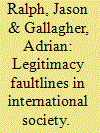| Srl | Item |
| 1 |
ID:
140825


|
|
|
|
|
| Summary/Abstract |
This article critically explores the historical transformation of the normative structure of international order brought about by legitimacy contests, and unpacks how power is deeply implicated in legitimacy claims amid the ongoing normative transformation of contemporary international society by virtue of the vanishing American unipolarity. By situating the analytical concept of legitimacy at the centre of this inquiry, it examines China’s attempts to win and command social acceptance of the legitimacy of its rising power as it confronts the challenges posed by the changing normative structure of contemporary international society. The struggle for legitimacy of a rising power, it argues, provides an alternative analytical framework within which to understand how rising Chinese power contests and is contested by the liberal global order dominated by the United States, a question that has fascinated and consumed many realist, liberal, and constructivist scholars. China’s engagement with the politics of legitimation is central to China’s peaceful rise. A careful examination of China’s struggle for legitimacy can yield insights into important systemic consequences of the transformation of the normative structure of international society.
|
|
|
|
|
|
|
|
|
|
|
|
|
|
|
|
| 2 |
ID:
139590


|
|
|
|
|
| Summary/Abstract |
There is a perceived legitimacy deficit in contemporary international society. A symptom of this is the political contestation surrounding the 2011 Libyan crisis and its influence on the 2011–13 Syrian crisis. This involved criticism being levelled at the coalition led by the so-called Permanent-3 for the way they implemented the protection of civilians mandate, as well as for the referral of the Libyan situation to the International Criminal Court. How the P3 respond to these developments will be driven in part by how this ‘legitimacy fault line’ is interpreted. The purpose of this article is to first give an interpretation that is informed by the work of contemporary English School scholars and the political theorists they draw on; and second to provide the context in which specific policy recommendations may guide the response of the P3 states. We argue that because the new legitimacy fault line divides on the procedural question of who decides how international society should meet its responsibilities rather than substantive disagreements about what those responsibilities are (that is, human protection and justice) the challenge to the liberal agenda of the P3 is not radical. However, we also argue that ignoring the procedural concerns of the African and BRICS states is not outcome neutral and could in fact do harm to both the ICC and the wider implementation of R2P. We consider two proposals for procedural reform and examine how the P3 response would impact on their claim to be good international citizens.
|
|
|
|
|
|
|
|
|
|
|
|
|
|
|
|